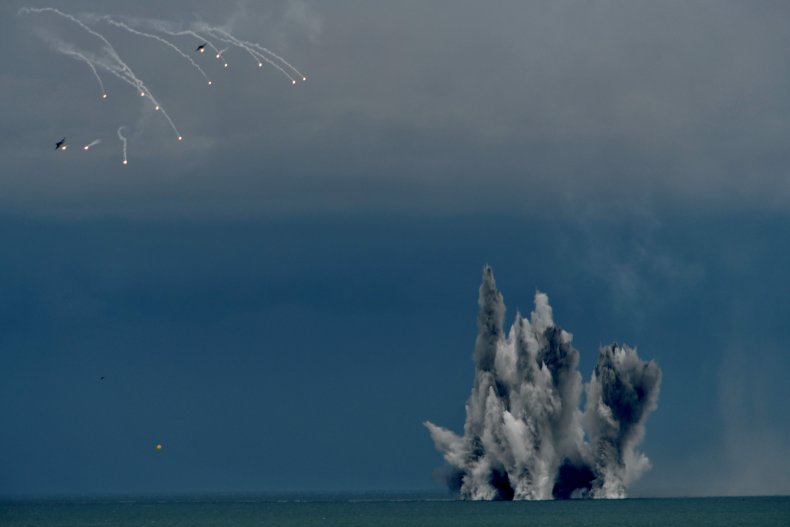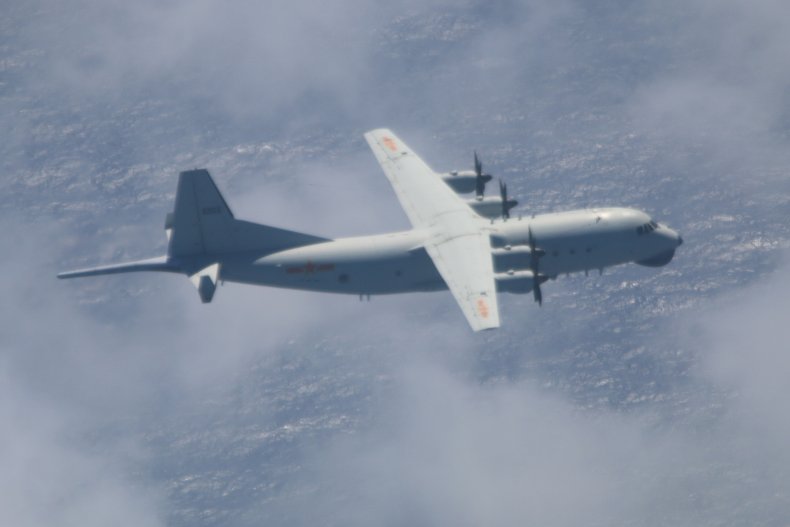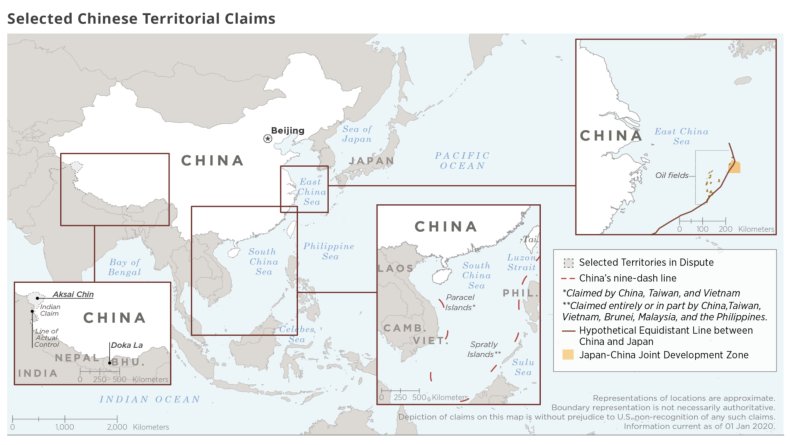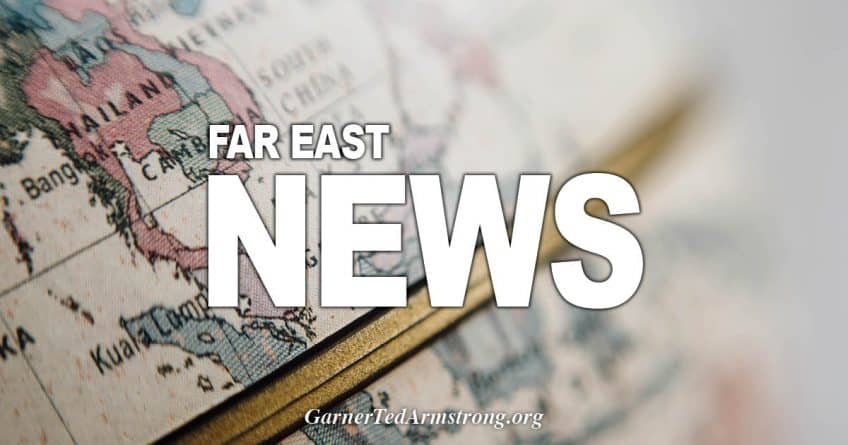Taiwan has long looked to the United States for protection from the massive forces of the Chinese mainland 100 miles to the west. Now Taipei is calling for robust defense ties with Washington amid growing concerns of potential conflict as Beijing’s warplanes conduct regular fly-by’s, threatening reunification by force.
Aircraft of the People’s Liberation Army continued to enter Taiwan’s declared air defense identification throughout the weekend, even as the self-ruling island celebrated “National Day”—an occasion commemorating the end of the Qing Dynasty and the establishment of the Republic of China, which Taiwan officially calls itself.
But as the rival People’s Republic of China made its presence known, Taiwan’s President Tsai Ing-wen delivered a military message as well.
“As commander-in-chief,” Tsai said, “I always have the future of our military and our military of the future in my heart.”
The Taiwanese leader vowed to buy and build more powerful military equipment during Saturday’s festivities.
“We will continue to modernize defensive combat capabilities and accelerate the upgrading of our asymmetrical capabilities to deal with military expansion and provocation from the other side of the Taiwan Strait,” Tsai said. “As we procure military hardware, we still remain dedicated to promoting our national self-defense capabilities.”
She also appealed for cross-strait stability and dialogue, but her words appeared lost on Beijing, where President Xi Jinping has vowed to assert control over Taiwan with military action if a peaceful path did not pan out.
Taiwan’s military reported on Sunday that Chinese Y-8 anti-submarine warfare aircraft continued a daily streak of sorties along the disputed strait that represents the de facto divide between the mainland People’s Republic of China, led by the Chinese Communist Party, and Taiwan, a democracy that officially calls itself the Republic of China.
With Chinese media outlets such as the Communist Party-run Global Times hyping up the chances of all-out war, Andrew Yang, spokesperson of the Taipei Economic and Cultural Office in New York, affirmed that Taiwan would double down on both indigenous and acquired military strength to deter an ever-looming Chinese incursion.
“Taiwan will continue to increase investments in its defense commensurate with the security challenges it faces,” Yang told Newsweek. “Taiwan will also seek security cooperation with the United States to build its defense systems that are cost-effective but lethal enough to make any invasions painful.”

Two U.S.-made F-16V fighter aircraft release flares after dropping bombs during the annual Han Kuang military drills in Taichung on July 16. The five-day “Han Kuang” (Han Glory) military drills starting on July 14 aimed to test how the armed forces would repel an invasion from China, which has vowed to bring Taiwan back into the fold—by force if necessary. SAM YEH/AFP/GETTY IMAGES
The case of Taiwan’s sovereignty is among the most serious challenges to U.S.-China relations, which have approached historic lows during the past year.
For more than four decades, the U.S. has adhered to the “One China” policy that acknowledges Beijing’s claims to Taiwan. But it has also maintained informal diplomatic and defense ties with Taipei, whose international links have dwindled to 14 nations since losing a 1949 civil war. China has refused relations with any country recognizing Taiwan, prompting much of the international community to shift relations as China opened up economically to the West over the past half a century.
The Trump administration has expanded upon the unofficial U.S. relationship with Taiwan, which has become a bone of contention as the two powers increasingly compete economically and geopolitically.
Last month’s annual Pentagon report on Chinese military power noted that “China continues to view the Taiwan issue as the most important and sensitive issue between the United States and China.”
Chinese forces have staged large displays of military might in protest to recent visits by senior U.S. officials to the island. One such series of exercises last month was rejected as “aggressive and destabilizing” in remarks sent to Newsweek by Pentagon spokesperson John Supple.
As Chinese fury toward the U.S. Taiwan policy mounts, some observers have warned the likelihood of a conflict has grown.
“The situation is escalating, mostly because of power competition and maritime disputes,” the Beijing-based South China Sea Probing Initiative told Newsweek in a statement.
The think tank deemed “unlikely” a possible military conflict between China and nearby members of Association of Southeast Asian Nations (ASEAN) that challenge some of Beijing’s territorial claims, but said “the risk of China-U.S. conflict is rising.”
Secretary of State Mike Pompeo downplayed this scenario in an interview Friday with radio host Hugh Hewitt. At the same time, he emphasized that the Trump administration would continue to work with Taiwan against China’s wishes.
“These are the obligations that the United States should undertake and is undertaking,” Pompeo said. “We recognize that this is a point of conflict with the Chinese Communist Party. We don’t want that. We want peace. But we are going to make sure that we live up to all of the obligations we have to Taiwan.”
Regional tensions remain high as the U.S. stepped up military activities near Taiwan and across the Asia-Pacific, including in the nearby East and South China Seas, where the Pentagon has challenged sweeping Chinese maritime claims.

A Chinese Y-8 anti-submarine warfare aircraft of the People’s Liberation Army is seen in this image shared October 11 by the Taiwan National Defense Ministry. Taiwan’s armed forces said radio warnings were issued and missile systems put on alert as the aircraft entered the island’s declared air defense identification zone. MINISTRY OF NATIONAL DEFENSE OF THE REPUBLIC OF CHINA
After the Arleigh Burke-class destroyer USS John McCain sailed near the Paracel Islands, which are controlled by China but also claimed by ASEAN member Vietnam, Chinese Southern Military Command spokesperson Senior Colonel Zhang Nandong called Friday on the U.S. to “immediately stop such kind of provocative actions, strictly manage and control its maritime and air military operations so as not to cause any eventuality.”
The U.S. has sought to court regional countries to pressure China as a part of a “free and open Indo-Pacific” plan. Also on board are fellow Quadrilateral Security Dialogue members Australia, India, and Japan, whose representatives met last week with Pompeo in Tokyo.
The top U.S. diplomat rallied the three countries against the Chinese Communist Party by asserting that it “is more critical now than ever that we collaborate to protect our people and partners from the CCP’s exploitation, corruption, and coercion.”
China’s embassy in Washington rejected Pompeo’s remarks in a reaction sent to Newsweek.
“China is committed to the path of peaceful development and firmly safeguards its sovereignty, security and development interests,” an embassy spokesperson said.
“At the same time, it is committed to resolving differences with other countries through dialogue and consultation,” the spokesperson added. “This is what we say and also what we do. We do not accept reckless smearing and groundless accusations against China.”

A map shows a selected series of China’s territorial disputes in the region as of January 1.U.S. DEPARTMENT OF DEFENSE
[Disclaimer]










